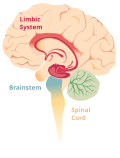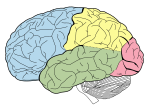Memory supports and enables social interactions in a variety of ways. In order to engage in successful social interaction, people must be able to remember...
33 KB (3,943 words) - 01:50, 7 June 2024
Rote learning (redirect from Rote memory)
learned quickly for an imminent test and rote methods can be helpful for committing an understood fact to memory. However, students who learn with understanding...
10 KB (909 words) - 02:15, 12 September 2024
larger interactions show that collective memory in larger social networks can emerge due to cognitive mechanisms involved in small group interactions. With...
45 KB (5,541 words) - 09:42, 30 October 2024
Eidetic memory (/aɪˈdɛtɪk/ eye-DET-ik), also known as photographic memory and total recall, is the ability to recall an image from memory with high precision—at...
22 KB (2,603 words) - 23:54, 15 November 2024
List of cognitive biases (redirect from List of memory biases)
False memory, where imagination is mistaken for a memory. Social cryptomnesia, a failure by people and society in general to remember the origin of a change...
108 KB (10,142 words) - 11:37, 17 November 2024
Clive Wearing (redirect from The Man with the 7 Second Memory)
tenor and pianist who developed chronic anterograde and retrograde amnesia in 1985. Since then, he has lacked the ability to form new memories and cannot...
13 KB (1,562 words) - 05:54, 22 October 2024
determine the nature of the complex interactions between growth hormones, variables such as social environment, and memory development as neural development...
33 KB (4,179 words) - 10:02, 7 July 2024
new memories after an event that caused amnesia, leading to a partial or complete inability to recall the recent past, while long-term memories from...
46 KB (6,164 words) - 19:32, 19 November 2024
Short-term memory (or "primary" or "active memory") is the capacity for holding a small amount of information in an active, readily available state for...
44 KB (5,536 words) - 07:00, 26 August 2024
Mnemonic (redirect from Memory aid)
distinguished between two types of memory: the "natural" memory and the "artificial" memory. The former is inborn and is the one that everyone uses instinctively...
36 KB (4,480 words) - 06:14, 6 November 2024
a particular cat. Semantic memory and episodic memory are both types of explicit memory (or declarative memory), or memory of facts or events that can...
60 KB (7,852 words) - 20:25, 9 October 2024
mutually exclusive. The idea of cultural memory draws heavily on European social anthropology, especially German and French. It is not well established in...
21 KB (2,805 words) - 23:41, 18 July 2024
of false memory can be exemplified in prominent situations involving social interactions, such as eyewitness testimony. Research on memory conformity...
46 KB (6,040 words) - 18:23, 5 October 2024
explicit memory (declarative memory) and implicit memory (non-declarative memory). Explicit memory is broken down into episodic and semantic memory, while...
55 KB (7,010 words) - 07:01, 26 August 2024
Hermann Ebbinghaus (redirect from Memory: A Contribution to Experimental Psychology)
psychologist who pioneered the experimental study of memory. Ebbinghaus discovered the forgetting curve and the spacing effect. He was the first person to describe...
21 KB (2,512 words) - 03:34, 6 August 2024
Forgetting curve (redirect from Strength of memory)
concept is the strength of memory that refers to the durability that memory traces in the brain. The stronger the memory, the longer period of time that...
13 KB (1,570 words) - 07:23, 2 November 2024
memories from the observer perspective. Studies also show that events with greater social interaction and significance produce more observer memories...
71 KB (8,275 words) - 19:05, 30 September 2024
hypersensitivity to psychostimulants, reduced social interactions and impaired prepulse inhibition, working memory and set-shifting. Similar to schizophrenia...
96 KB (11,597 words) - 23:42, 21 September 2024
with great contributions into memory research. Janet contributed to false memory through his ideas on dissociation and memory retrieval through hypnosis...
68 KB (8,199 words) - 20:16, 24 October 2024
Amnesia (redirect from Memory loss)
memory caused by brain damage or brain diseases, but it can also be temporarily caused by the use of various sedative and hypnotic drugs. The memory can...
56 KB (7,148 words) - 17:32, 27 October 2024
working memory. Other suggested names were short-term memory, primary memory, immediate memory, operant memory, and provisional memory. Short-term memory is...
112 KB (14,189 words) - 15:26, 6 October 2024
regulation of hunger, research on the neural basis of learning and memory, and in certain social phenomena such as the false consensus effect. Classical conditioning...
66 KB (8,709 words) - 03:33, 24 September 2024
Recall in memory refers to the mental process of retrieval of information from the past. Along with encoding and storage, it is one of the three core processes...
89 KB (12,146 words) - 03:33, 19 February 2024
Exceptional memory is the ability to have accurate and detailed recall in a variety of ways, including hyperthymesia, eidetic memory, synesthesia, and emotional...
47 KB (6,234 words) - 22:41, 22 October 2024
Involuntary memory, also known as involuntary explicit memory, involuntary conscious memory, involuntary aware memory, madeleine moment, mind pops and most commonly...
25 KB (3,340 words) - 14:43, 26 September 2024
Hyperthymesia (redirect from Superior autobiographical memory)
also known as hyperthymestic syndrome or highly superior autobiographical memory (HSAM), is a condition that leads people to be able to remember an abnormally...
50 KB (5,375 words) - 07:20, 15 November 2024
scientifically controversial and remains disputed. Dissociative amnesia was previously known as psychogenic amnesia, a memory disorder, which was characterized...
23 KB (2,561 words) - 07:54, 2 October 2024
Henry Molaison (section Insights into memory formation)
consolidation of memories in the way that "interactions between the medial temporal lobe and various lateral cortical regions are thought to store memories outside...
36 KB (4,265 words) - 21:09, 14 November 2024
memory recall is subject to distortion by other intervening cognitive functions and operations such as individual perceptions, social influences, and...
32 KB (4,054 words) - 07:18, 29 April 2024
Memory is the faculty of the mind by which data or information is encoded, stored, and retrieved when needed. It is the retention of information over time...
134 KB (16,670 words) - 23:31, 19 November 2024









